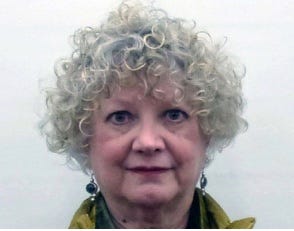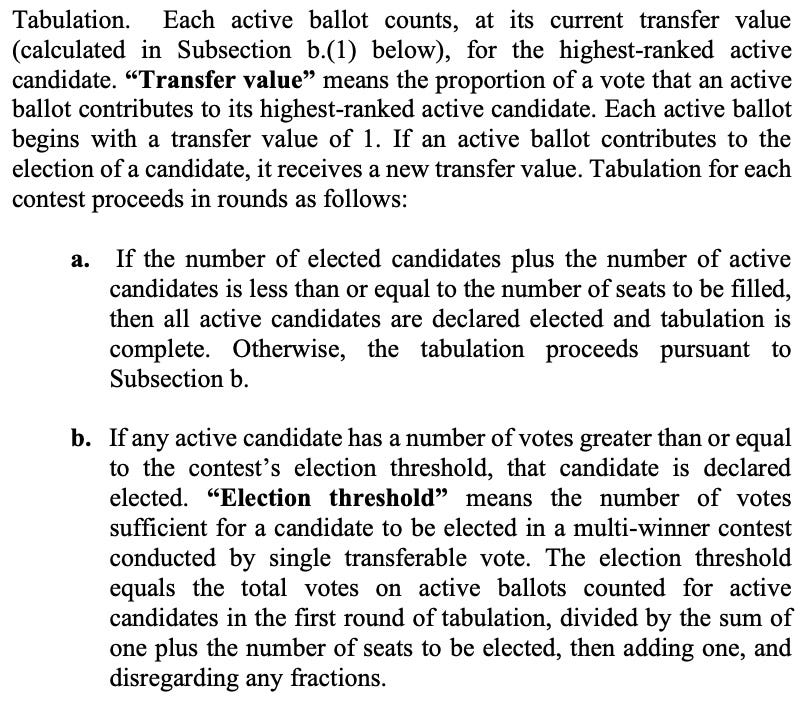There’s a very quiet little piece of legislation now working its way through the mostly invisible process of making the damn new city chapter happen.
And guess what? Surprises abound! And proves the old saying, “The debbil’s in the details.”
The document is called…
…and it’s 11 pages of rather, shall we say…dense prose. You might want to read it—particularly if you were one of the Portland voters who put this wheel in motion.
Let’s paw around in the fine print…
The vanishing ballot
The first oopsie comes in the voting methodology (first for any city of any size) for members of the new, four-district/ 12-member city council. The eager beavers promoting the new voting method painted a rosy picture of scads of new (and preferably POC) candidates out there in the darkest East side and anywhere-but-Goose-Hollow thronging the ballot. Diversity!
Multnomah elections director Tim Scott—the guy whose machines will have to tally and transfer and mix ‘n’ match votes—points out something that apparently eluded the folks on the charter commission: ballots are finite, stupid.
Woulda been nice if the commission had taken his testimony—which they didn’t. Nor did the charter commission solicit testimony from Clear Ballot, the company whose machines and software will do the vote-counting.
Here’s what he had to say to the dreamers…
Some members of the Charter Commission made it clear that they wanted voters to be able to rank all candidates. That’s not a realistic scenario, given the number of candidates that file for offices like Portland Mayor. I’ve seen that number as high as 24.
A grid-style ballot with 24 candidates and 24 rankings just isn’t physically possible, unless we want to hand count ballots, which I don’t think anyone wants us to do with 450,000 registered voters in the City of Portland.
He helpfully points out that the draft city code caps the number of ballot slots at…
EIGHT.
Why?
Back to Mr. Scott…
Our ballot paper can only be 8.5" wide and still be scanned by our ballot tally system so that limitation limits the number of ranks that would fit on the paper. For the council district positions there will be three winners in each contest and voters will be able to rank up to 8 candidates, assuming the current draft is adopted. If there were 9 filed candidates, voters would have to choose their 8 favorites.
…and…
Our ballots can be up to 17" long so there is almost no limit to the number of candidates that could file and be listed, only a limit to the number of rankings which run on the x axis where the paper width is a maximum of 8.5".
Which is bad news for all of the racial/sexual/union/developer/progressive groups salivating at getting their very own robots on the council.
As the proposed new city election code coyly observes…
Software limitations may limit the number of candidates to 6 rankings.
Traffic jam time!
And, one suspects, time for a federal lawsuit.
But wait! There’s more fine print, buried in the tormented prose of the proposed city code. Let’s call it…
If they were dumb enough to approve the charter, are they smart enough to figure out how to vote?
The new ballot—which will be subject to a “Voter Education Partners” campaign at a cost of $675,000—will probably discombobulate voters. So the proposed code has all sorts of escape clauses:
Overvoting: The dummie-voter gives more than one candidate the same ranking. Easy:
The preliminary choice is the overvote is ignored and the candidate the voter ranked number 2 is effectively ranked number 1.
Short version: we know better than you do. Please try to do better next time.
Skipped rankings: The mope ranks one, two, but leaves three blank. Answer:
The preliminary choice is the skipped ranking is ignored and the candidate the voter ranked number 3 is effectively ranked number 2.
Does anyone smell a “hanging chad-style” recount here?
Protest votes: As the code notes…
Voters every year write in fictional candidates.
…my favorite, when confronted by machine apparatchiks, is “Bozo.” That’s now a no-no: “write-in” candidates will now have to certify themselves with someone or other by 8 pm election day.
Bye-bye Bozo.
To this day, it’s safe to say very few voters realize they will be faced with three—count ‘em—modes of voting in 2024.
There will be a presidential first-past-the-post, majority-rules election. We all know who’ll cart off the state’s electoral votes.
Then we’ll be asked to vote for mayor and auditor. It now seems clear that Mayor Wheeler will stand for re-election—what else is a rich kid gonna do? If he does no better next time around than he did against a nutty Marxist, we will start juggling votes in what’s called an “instant runoff.”
That method, used in Alaska, took several weeks to anoint a winner—and sent a Democrat to the House of Representatives for the first time in the state’s history even though in the first round of Alaska’s ranked-choice-voting system, the Democratic candidate finished fourth, with just 10 percent of the votes. See how that works?
This “instant runoff” scheme is simple, sorta. If someone gets over 50-percent of the “active ballots” (you don’t want to go there, folks), they’re in. If not, then the lowest-ranked candidate (and, please remember the eight-slots limit and pray that there aren’t 10 candidates, including Candace Avalos) gets chopped out and votes float heavenward.
If that doesn’t clean things up, the machines whir again and chop off the losers and move votes up…up…away!
It is well known that this system can be played, with smart folks telling supporters to vote their favored candidate second in the rankings.
As for any voters who refuse to play this mathematical game—tough: you’re out. You only get one lousy vote.
City council is where things get truly weird, as we have mentioned a half-dozen times. That’s because this will be the third scheme—one that no city of any size has ever attempted. For the first time, they’ve let us look under the hood. Gosh! There are a lot of wires and funny-looking things in there!
Here’s what will happen, according to the draft ordinance…
Got that? You’ve just begun…
And, somehow, someone wins.
Just a reminder: this software is now being written and will have to pass both federal and state tests. Assuming it does, ballots will have to be printed and…well…
I will refrain from trying to simplify this and leave it up to local media to supply the superlatives for my fellow Portlanders. Who are in for some big surprises.
Me: I’ll buy Lottery tickets.
There’s yet another city publication out…
…which kicks off with…
… which leads one to suspect that City Hall’s $-half-million man—barring a nasty surprise from the citizen-commission setting up salaries for the new regime’s bureaucrats (see below)—is kicking off his campaign for city manager. After all, he promises that…
A citywide voter education campaign will create a new sense of ownership that will advance Portland’s potential.
You and your neighbors will understand how your choices on the ballot result in community members being elected to represent your neighborhood in City Hall.
Although a skeptic might say that, with the city chopped up (by card-carrying progressives) the “neighborhoods” will get lost in the four big mega-districts.
And, by the way, who gets felony flats?
There is the usual boiler-plate blah-blah in the nicely designed report and few suprises. The transition is estimated (and you know how “estimates” go in government) at between $4-million and $5.9-million, which is a lot of wiggle-room. You might be able to house a couple dozen homeless for that kind of money.
A lot of those dollars will, as per the norm, be doled out to consultants and non-profit community groups…c’mon down, Coalition of Communities of Color!
A few of the leeches are identified…
…the project team used a competitive process to identify and contract with NEX Strategies, a professional consulting firm focused on organizational development and change management.
…and…
…the City used a competitive two-phase solicitation process to contract with Flo Analytics, a nationally known local firm specializing in geographic information systems (GIS) and data analytics.
……without bothering to say what either firm will be paid—although there’s a vague budget item for a “Change Management Contract” for $600K. Nor is there any hint about how the firms’ performance will be measured. SOP in Portland.
There will be yet another commission full of the cherry-picked: the Government Transition Advisory Committee, another patronage play for the mayor. He’ll appoint members in April. Its purpose, a page-long word-fog, is classically unspecific. Prediction: they’ll say yes to Jordan and Wheeler.
Meanwhile, other Commissions are doing…something. We’ve visited the members of the District outfit before—a low-horsepower group that did a great job of seeming to be terminally confused at their first meeting.
The Salary gang, just announced is all female, no POCs—an obvious case of “disproportion” and progressive slippage…




…but, remarkably, they all actually have backgrounds in that odious profession, “Human Resources.” It will be more than interesting to see what number they will attach to the city manager’s position. One wonders if they will take testimony from Mr. Jordan.
None of this, it goes without saying, interests local media. They will wait, mindlessly, until everything is neatly (if expensively) wrapped up and then will toss some confetti and go on to the next drug-dealer’s murder.
And the city? The drain gurgles…













Thanks Richard for figuring out the Euclidean meets Orwellian ballot rules that Portland is inflicting on its citizens. I'm sure it's coming to a ballot near me soon.
I ran for office 7 times on a county-wide basis (and about 5 times for the lowest office possible - precinct person, back when I thought there was hope in the Democratic Party) and while the office of District Attorney in Oregon is non-partisan, offices like Attorney General (and Secretary of State) are illogically partisan, and right now VERY partisan.
I have voted for various Disney characters but I was informed that such votes were not counted unless either the fictional candidate paid or the votes made an actual difference. In 2008 John Kroger (who I supported) ran as the Democratic and successful candidate as Oregon Attorney General. For whatever reason the GOP did not mount a candidate so, unbeknownst to me and without my endorsement, about 200 people in Clatsop County wrote me in as the Republican candidate for AG. I only found out it because had the statewide write-in votes actually reached some threshold, I might have briefly been the GOP candidate for AG (not a post I was looking to run for back then).
Local media? LOL... you can't get local media to write about anything substantive. The Portland media is a joke, they play it so safe. As to the secrecy of some of Portland politics, that's just the new way the power players run things today. It's disgusting really, how they just do what they want and never listen to what the people want. There was more citizen engagement that was actually effective in the 1970s. Now, they give you your three rushed minutes to speak to the king before the Gong bell sounds and you're kicked out. Try to rush out a few words of concern or complaint and they throw you out. Yell a little, feel "heard" in some way? Oh brother. It's all just a stupid show, nothing but a show.
"Okay, get it off your chest, maybe make some sense but we're still gonna do exactly what we wanna do!"